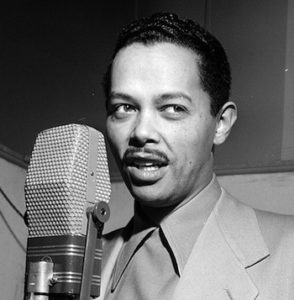
Billy Eckstine
This date marks the day Billy Eckstine was born in 1914. He was a Black singer.
Born William Clarence Eckstein in Pittsburgh, he began singing at the age of 11 but, until his late teens, was undecided between a career as a singer or football player. He won a sporting scholarship but broke his collarbone soon after deciding that singing was less dangerous.
Billy Eckstine grew up in Washington, D.C., where he attended Armstrong High School. His parents emphasized education, so after high school, he enrolled in college, first at St. Paul Normal and Industrial School in Lawrenceville, Virginia, then at Howard University in the nation's capital. After only a year of college, he won an amateur music contest at the Howard Theater and decided to sing full-time.
From 1934 until 1939, Eckstine, who changed the spelling of his name because a club owner thought it looked "too Jewish,” performed as a vocalist with small dance bands in the mid-Atlantic region. He worked mostly in the northeastern states in the early 1930s and, towards the end of the decade, joined the Earl Hines Band in Chicago. Although far from being a jazz singer, he opted for a highly sophisticated form of balladry. Eckstine loved working with jazz musicians, particularly the young experimenters who drifted into the Hines band in the early 1940s: Wardell Gray, Dizzy Gillespie, and Charlie Parker. While with Hines, he developed into a competent trumpeter and, later, valve trombonist, having first mimed as a trumpet player to circumvent union rules. In 1943, Eckstine formed his band based on the advice and encouragement of Budd Johnson.
Although his original intention was to have a band merely to back his vocals, Eckstine gathered an exciting group of young bebop musicians and thus found himself the leader of the first true bebop big band. During the band's four-year existence, its ranks were graced by Gray, Parker, Gillespie, Gene Ammons, Dexter Gordon, Miles Davis, Kenny Dorham, Fats Navarro, and Art Blakey. They played arrangements by Gillespie, Johnson, Tadd Dameron, Gil Fuller, and Jerry Valentine. Eckstine also hired the other singer, Sarah Vaughan, of the Hines band.
In 1947, the band folded but had already inspired Gillespie, who formed his bebop big band that year. Eckstine's commercial recordings during the life of the big band were mostly ballads that he wrapped in his deep, liquid baritone voice. With band-leading days behind him, he continued his career as a successful solo singer. He gained a huge international reputation as a stylish balladeer.
During his long career, Eckstine had many hit records, including “Jelly Jelly,” “Skylark,” “Everything I Have Is Yours,” “I Apologize” (stylistically covered by P. J. Proby to great success), “Prisoner Of Love,” “Cottage For Sale,” “No One But You” (number three in the UK charts in 1954), “Gigi” (number eight in 1959), and several duets with Vaughan, the best-known being “Passing Strangers,” which, although recorded a dozen years earlier, reached number 17 in the 1969 charts. In later years, Eckstine recorded a new single with Ian Levine as part of his Motown revival project on the Motor City label. He died in 1993.
All That Jazz: The Illustrated Story of Jazz Music
General Editor: Ronald Atkins
Copyright 1996, Carlton Books Limited
ISBN 0-76519-953-X